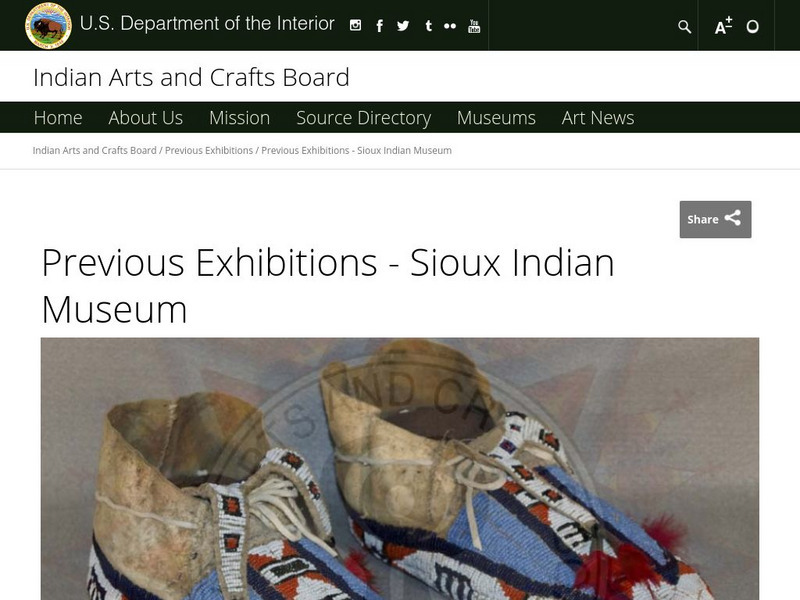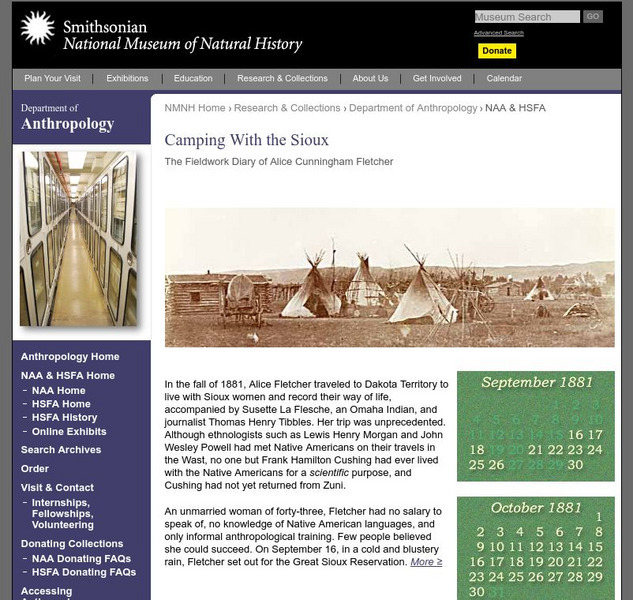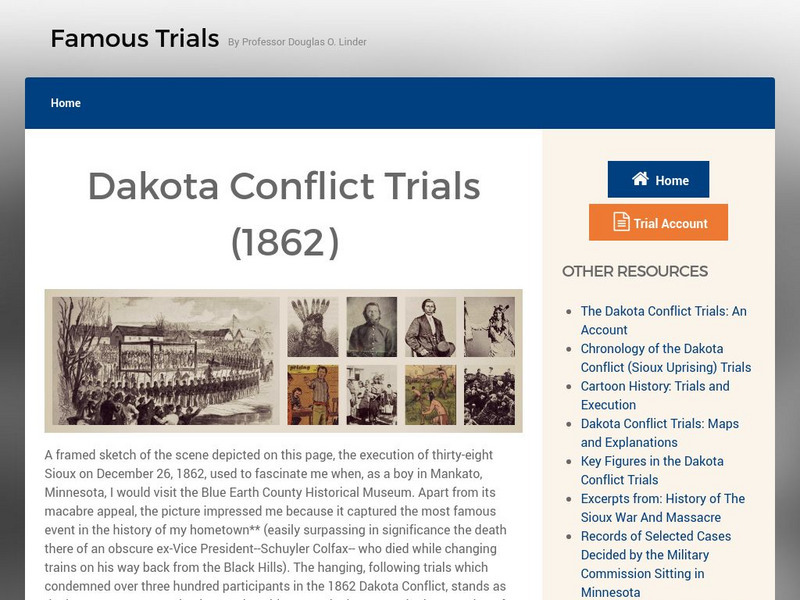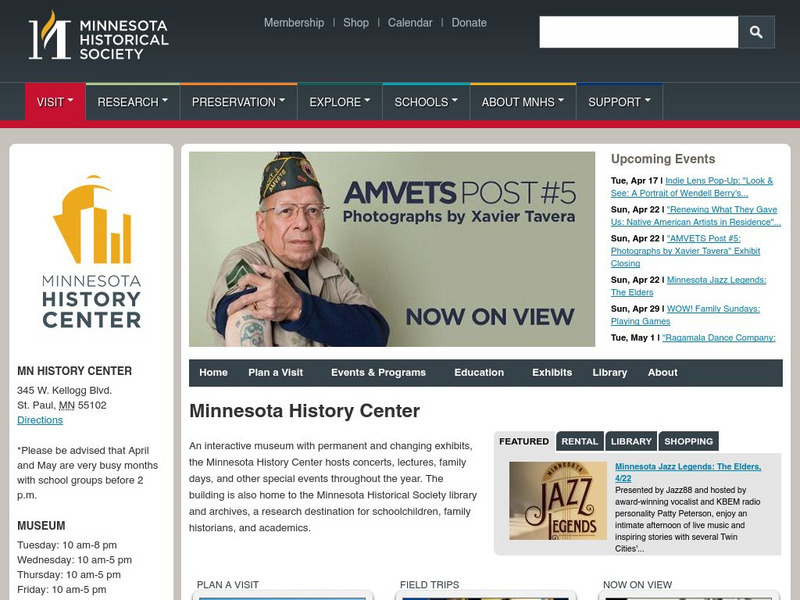Curated OER
U.s. Department of the Interior: Indian Arts and Crafts Board: Sioux Indian Museum, Rapid City, South Dakota
There are a few Sioux Indian artists listed here under this museums archive of Exhibits. If you click on each artist, you will see samples of their work and a brief written review of the individuals works.
Library of Congress
Loc: America's Story: North Dakota
What does "Dakota mean" in French? What tribe did Sacajawea belong to? The Library of Congress's America's Story has answers and more about the state of North Dakota.
PBS
Mpr: The Meaning of Sioux Music and Song
This site from the Minnesota Public Radio provides the text of a 1915 article written by musician and self-trained anthropologist, Frances Densmore. Densmore spent years studying the music and culture of the Teton Sioux and other native...
Other
The Weekly South Dakotan: South Dakota History for 4th Grade
From the very beginning and through the twentieth century, this comprehensive collection of lessons will enrich students studying the history in between and the effects on South Dakota.
Smithsonian Institution
National Museum of Natural History: Camping With the Sioux: Fieldwork Diary of Alice Fletcher
A fascinating site that presents the story of Alice Fletcher who traveled to Dakota Territory to live with Sioux women. Click on dates on the calendar for diary entries. Also includes historic photo gallery.
Other
Standing Rock Sioux Tribe
Learn about the history and culture of this Native American tribe in North Dakota. Includes statistics on the tribal community.
PBS
Pbs: Indian Pride: Spirituality: Lesson Plan
Students will be able to understand the connection between land and spirituality for Native Americans (specifically Sioux or Lakota/Dakota) and how this impacts economic decision-making.
University of Missouri
Famous Trials: Chronology of the Dakota Conflict (Sioux Uprising) Trial
Contains a chart of the chronology of the Dakota Conflict trials from 1851 to 1890.
University of Missouri
Famous Trials: The Dakota Conflict Trials of 1862
This site offers an in-depth study of the 1862 Sioux uprising. The framed web pages offer a chronology of the uprising , a cartoon history, pages of maps, biographies of key figures, accounts of the trials and the execution, an...
US National Archives
Our Documents: Treaty of Fort Laramie(1868)
Read and view a copy of the complete text of the treaty of Fort Laramie which recognized the Black Hills as part of the Sioux Reservation. Accompanying documentary explains how the treaty was broken as a result of the discovery of gold...
Houghton Mifflin Harcourt
Harcourt: School Publishers: Carving a Memorial to Chief Crazy Horse
This Harcourt Publishing site is all about the memorial carved in the Black Hills of South Dakota in honor of Chief Crazy Horse.
A&E Television
History.com: 10 Things You May Not Know About Sitting Bull
Get the facts about one of the most legendary Native Americans of the 19th century. Sitting Bull was born around 1831 into the Hunkpapa people, a Lakota Sioux tribe that roamed the Great Plains in what is now the Dakotas.
Countries and Their Cultures
Countries and Their Cultures: Teton
A page containing information about an Indian tribe known as the Teton who live in South Dakota. Investigate their family life, economy, religion, and history.
Other
West Virginia University: A Summary of Native American Religions
This is an excellent introduction to Native American religious beliefs and practices. Includes an explanation of the major Native American Religions and their history. Site is extensive and exclusively text-based.
Other
Minnesota Territory: The Treaty Story
Offers a brief explanation of the causes and results of the Sioux Uprising in 1862.
C-SPAN
American Writers: Black Elk
An informational site on Black Elk. Includes general information about his life, works, and writings, including Black Elk Speaks. Also includes links to other sites.
National Endowment for the Humanities
Neh: Edsit Ement: Anishinabe Ojibwe Chippewa: Culture
Though written for grades 3-5, this lesson plan can be easily changed to help students of all ages learn about the Chippewa people. Additional resources provide historical, cultural, and geographical facts concerning this Native American...
Curated OER
Wikipedia: National Historic Landmarks in Minnesota: Pipestone National Monument
Pipestone National Monument preserves traditional catlinite quarries just north of Pipestone, Minnesota. The catlinite, or "pipestone", was and is used to make peace pipes, vitally important to traditional Plains Indian culture. The...
Other
An Introduction to North America's Native People: Plains Culture Area
A wonderful website from Cabrillo College on the Plains Indians can be found here. It gives an in-depth historical overview, profiles of numerous Plains tribes, the significance of the horse, and great information on their culture and...
















